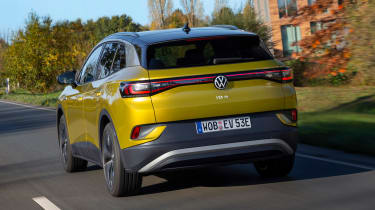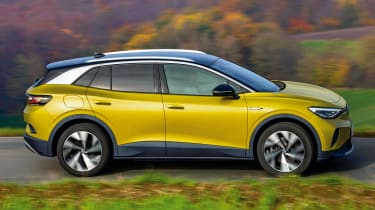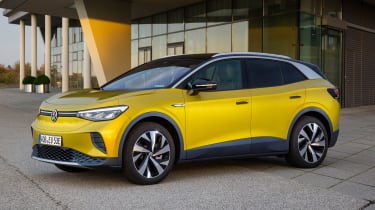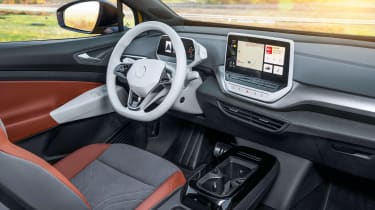2022 Volkswagen ID.4 electric SUV: specs and prices
ID.4 Life Pure is now the entry-level model in the range, with prices starting from £32,150 after plug-in grant
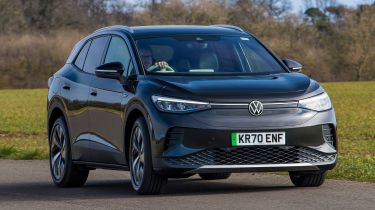
Volkswagen has announced pricing for the 2022 model year of the ID.4. The range now starts with the ID.4 Life Pure, which is the only variant eligible for the UK government’s plug-in car grant (PiCG).
Four trim levels are now available for the ID.4, named Life, Style, Family and Max (equipment and prices detailed below). The Pure and Pure Performance drivetrains are only available in the Life and Style trims, with the Pure using a 146bhp electric motor and a 52kWh battery.
Upgrading to the Pure Performance costs £1,380; these models feature the same 52kWh battery as the Pure, but with a more powerful 168bhp electric motor. With either powertrain, the ID.4 Life is capable of 213 miles on a charge, while the Style has a 211-mile range.
Above those are the ID.4 Family and Max trims, both of which use the Pro Performance powertrain. This comprises a 77kWh battery and 201bhp electric motor, which allows you to go from 0-62mph in 8.5 seconds.
The driving range of the ID.4 Pro Performance varies between each trim level, with Family trim cars capable of 317 miles on a charge, while the ID.4 Max has a 316-mile range.
Above those is the ID.4 GTX, which we've tested. Volkswagen’s first high-performance electric car, the GTX produces 292bhp from its dual-motor setup and is capable of 0-62mph in just over six seconds.
For our full verdict on the ID.4, make sure to read our in-depth review.
Volkswagen ID.4 pricing, trim levels and specifications
The ID.4 Life Pure is now the entry-level model in the range – and importantly is the only model in the line-up eligible for the UK government’s plug-in car grant (PiCG). Prices for the ID.4 Life Pure start at £32,150 after the grant.
Life trim features LED headlights, 10-colour ambient lighting, wireless smartphone charging and a 10-inch infotainment screen. This version also comes as standard with a wealth of safety systems, like lane-keeping assistance, traffic-sign recognition, front and rear parking sensors and adaptive cruise control.
Style (£38,150) is more design-focused, building on the City trim with 18-inch alloy wheels, matrix LED headlights, a front light strip and 3D design tail-lights. For an extra £1,380, you can upgrade to the Pure Performance powertrain in the Life and Style models.
The ID.4 Family (£45,520) and Max (£49,990) use the larger 77kWh battery and more powerful 201bhp motor of the Pro Performance powertrain.
Family (£45,250) gets upgraded 19-inch alloys and LED matrix headlights, as well as a panoramic sunroof and rear-view camera, while the top-spec ID.4 Max (£49,990) comes with a larger 12-inch infotainment screen, an augmented-reality head-up display and the Sport Pack Plus, which includes progressive steering and dynamic chassis control. Depending on your choice of trim, there are additional alloy-wheel choices, with sizes up to 21 inches.
As of July 2021, the Comfort and Infotainment packages are now standard on all ID.4s. That means all come with heated front seats and steering wheel, Discover Navigation Pro sat nav and wireless smartphone charging.
For 2022, Volkswagen has also introduced option packs for the ID.4 range. The Infotainment Package Plus (£2,200) adds the augmented-reality head-up display from higher-spec models and an upgraded sound system. The Assistance Package (£1,040) adds a rear-view camera, keyless entry and start/stop.
There’s also the Comfort Package Plus (£1,190), Assistance Package Plus (£2,000), Design Package (£1,780) and Design Package Plus (£2,470), as well as the Sport Package (£340) and Sport Package Plus (£1,140).
Electric motor, battery, performance, charging and range
Both the Pure and Pure Performance powertrains use a 52kWh battery and a single electric motor. ID.4 Pures produce 148bhp and 220Nm of torque, while Pure Performance cars have a total power output of 168bhp and 330Nm of torque. The 52kWh battery unit in both sees the ID.4 City capable of up to 213 miles on a charge, while the Style has a driving range of 211 miles.
Family and Max models are offered exclusively with the Pro Performance powertrain using a 201bhp electric motor, delivering a 0-62mph time of 8.5 seconds and a top speed of 99mph. These ID.4 models also use a 77kWh battery and can reach over 310 miles of driving range.
The top-of-the-range, performance-orientated, four-wheel-drive ID.4 GTX model uses the same 77kWh battery, but produces 292bhp from its dual-motor setup. The ID.4 GTX is capable of 0-62mph in just over six seconds, and a top speed of 111mph.
Charging speed maxes out at 125kW if you can find a fast enough charging point; at that rate, VW says, the ID.4's battery can be topped up to 80% capacity (good for 200 miles' driving) in 30 minutes. All Volkswagen ID batteries are guaranteed to retain at least 70% of their original capacity for eight years or 160,000 kilometres (just under 100,000 miles).
The ID.4 is also available with a range of driver-assistance systems bundled together under the 'IQ.Drive' banner. These include parking sensors, lane-keeping assistance, autonomous emergency braking and adaptive cruise control, while there's also an 'Eco Assistance' function that prompts the driver to ease off the accelerator at appropriate times to aid efficiency.
Exterior design
Volkswagen describes the ID.4 as having a "powerful and confident appearance", with plenty of "flowing and strong lines" in its design. An undulating line flows down the side of the car from the edge of the headlights all the way to the rearmost window pillar, while dark cladding lower down gives the ID.4 a tough, off-road-capable look.
In common with the ID.3, it has no radiator grille due to there being no need for engine cooling, while contrasting roof colours and a silvered strip over the windows (the latter part of an optional 'Exterior Style Pack') complete the car's major styling features.
Alloy-wheel sizes of up to 21 inches are be available, as well as a towing bracket and roof rails. ID.4 Family and Max models also features a panoramic glass roof and powered tailgate opening, while up front it has VW's 'IQ.Light' LED matrix headlights and the tail-light clusters are LEDs, too.
Colours available on the ID.4 in Europe are Blue Dusk Metallic, Glacier White Metallic, Honey Yellow Metallic, Scale Silver Metallic, Moonstone Grey and Manganese Grey Metallic – and it's likely that most of these will be offered to UK buyers, too. Exterior dimensions are 4,584mm (length), 1,852mm (width) and 1,612mm (height).
Interior, technology and practicality
Volkswagen says that thanks to its long wheelbase, the ID.4 offers as much interior space as a model from the class above.
Most of the car's functions are controlled by touchscreen interfaces, with a main screen size of up to 12 inches depending on trim level. This operates features such as the sat nav, phone connectivity and driver assistance systems, while there's also a compact display directly in the driver's field of view that displays the most important information, selectable using steering-wheel-mounted controls.
An augmented-reality head-up display is among the optional features that can be added, but comes as standard on top-spec Max models. The whole system can also be voice controlled. Connecting an Apple or Android smartphone is also possible thanks to the presence of VW's App Connect software, while 'over-the-air' software updates allow for bug fixes or enhanced features to be carried out without having to visit a dealership.
Volkswagen says the ID.4's boot will hold up to 543 litres of luggage with all seats in place, increasing to 1,575 litres when the rear seats are folded down and the car is loaded to the roof. As mentioned above, a powered tailgate is also available, while a luggage net, partitions and variable boot floor also aid versatility. Finally, an optional towing bracket allows the ID.4 to haul a braked trailer or caravan weighing up to 1,000kg. Handily, the SUV has a 10.2-metre turning circle – identical to that of the smaller ID.3 hatchback.
Most Popular

EV Deal of the Day: Dacia Spring is amazingly good value at £116 per month

